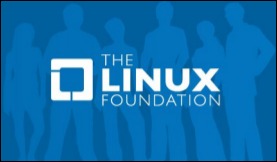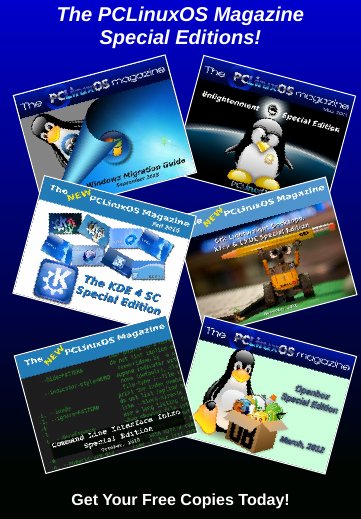| Previous
Page |
PCLinuxOS
Magazine |
PCLinuxOS |
Article List |
Disclaimer |
Next Page |
Grab Your Favorite Software From Yesteryear |
|
by Paul Arnote (parnote) Most Linux users (PCLinuxOS users included) got their start with computers using a commercially available OS. Exceptionally few actually started with Linux. Along the way, we all encountered software that we came to love. Much of that software was designed to run on Microsoft Windows, the commercially available OS that held/holds the lion's share of the OS market. However, as I'm sure we're all aware, Linux is NOT Windows, and in MANY aspects, we Linux users are thankful for that. But, it also means that it's typically not a trivial task to hang on to and use those software titles that we came to love along our journey, if we can even get them to run at all.  To run those cherished programs, we typically have a few choices. One choice is to dual boot our computer with Linux and Windows. That has challenges all of its own. This usually means you have to log out of your Linux account, and reboot your computer into Windows. That can make sharing data between Linux and Windows a chore, with all sorts of hoops to jump through (like storing/exporting data output onto a shared drive or a USB connected drive of some sorts). Another choice is to run WINE on your Linux computer. While WINE has gotten progressively better at running Windows programs over the years, it's still pretty much a crap-shoot as to whether or not your favorite Windows program will run under WINE. Some programs are ridiculously simple to run under WINE, while others are persistently stubborn in their determination to not run under WINE. There is a commercially available version of WINE, called CrossOver from CodeWeavers, that tends to run a bit better. That, though, will set you back $74 (U.S.) annually, which is nearly the cost of a full-blown version of Windows. For an additional $420, they're happy to sell you a "lifetime" version of CrossOver. The folks at CodeWeavers have, essentially, tweaked and tuned the WINE code so that it has a better track record of running more Windows programs. A similar option exists for running old DOS programs. Users can run DOSBox or some other DOS emulator on the Linux desktop. These DOS emulators typically do a pretty good job at running DOS programs. This is probably due to the relative simplicity of DOS, compared to Windows. Yet another choice is to run an actual copy of Windows in a virtual machine, such as Virtual Box. Even though this requires you to have an actual copy of Windows to install as a virtual machine, it allows you to run a fully functional copy of Windows on your Linux desktop. Of course, there is one other choice, and it is the one that I've made. If something can't be done under Linux in its native environment, I'm typically not interested. I don't run any of the methods. No dual boot. No WINE. No virtual machine. And, no Windows. I don't feel as if I'm missing out on anything. In my Linux past, I've done each of the other three methods, all successfully. Everyone's needs are different, and each method has their own pitfalls and challenges. Thankfully, Linux users (as a whole) are pretty resourceful, so they can usually find a way to resolve the challenges that each approach presents, along with workarounds to the pitfalls.  I am definitely NOT a "gamer." Oh, I've played some games in my Windows life, like Wolfenstein, Doom, Descent, and Quake. But that was years ago. Today, Solitaire is more my speed. And, I was never very good at the games, anyway. They were just a diversion to fill up my free time with something enjoyable. Even then, I didn't have sufficient time to devote to improving my gameplay. Today, it also probably has something to do with the fact that I have much less "free time" than I used to. My "free time" has demands on it by a six and nine year old and all of their extracurricular activities. For those users who have loftier "gaming" pursuits, they may employ one or more of the methods we previously discussed for running their Windows games. Some may employ all three methods, just to ensure that they can play their games. A Software Motherlode So why talk about how to run Windows on your Linux computer? After all, aren't most of us "Windows refugees," fleeing the tyranny of Windows? I'm sure we all have software titles from our past that still bring a smile to our face. They may be fun to run. Or, they may be satisfying merely for their familiarity. But whatever the case, most of us have probably reminisced about playing them again. Well, you're in luck. The Internet Archive has a collection of around 72,000 CD-ROM titles available for download. Many of them are offered as ISO files, so you can "burn" them to whatever medium you choose.  Game enthusiasts will be pleased with the collection of CD-ROM based games available. The image above shows some of the games titles available. There are many, many more titles available than what I've shown here. I just tried to show some of the titles that were extremely popular in their day, and that most people probably know about. But the selection doesn't stop there. In perusing the available titles, I found almost every version of Windows available. Yes, even including [ew!] Windows Me, Vista, and Windows 8. I also found old stalwarts, such as Adobe Photoshop, Adobe Illustrator, multiple Corel titles, educational software, entertainment software, productivity software, and much more. Do you remember all those CD-ROMs sold in large chain stores, loaded with photos and clipart? Well, there's a great selection of those available, too. Keep in mind that much of this software has pretty much been abandoned, so using it may incur some security risks. Some titles have never been updated, and others have been superseded by better, more secure versions. In other words, you will have to use them at your own risk. Aside from the games, I'm certain that most Linux users can find native-Linux software that is able to get tasks done. But, if you have a hankering to reach back in your past and re-experience some of your favorite software, this is the place where you might find those software titles. But, be prepared. It may take some time to filter through the nearly 72,000 software titles presented on Internet Archive. |


